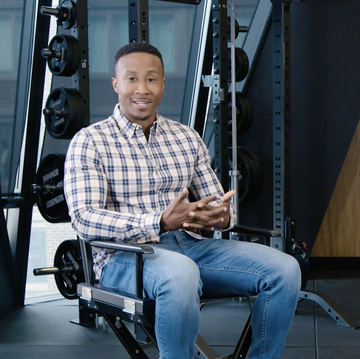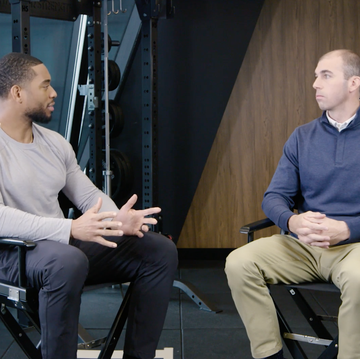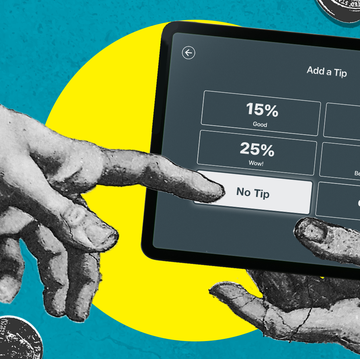Some guys just seem destined for heroic careers.
They can't sit silently through meetings; they're not content to simply follow orders. They're enterprising and outspoken. They wear their ambition like shiny cuff links, commanding our attention with every gesture and reminding us that we should all bring more passion, creativity, and backbone to our jobs. Except this isn't destiny—it's determination. (The rules have changed since your dad was climbing the corporate ladder. Check out more of the New Tools for Career Success.)
The entrepreneurs you'll meet on the next few pages are like that. They made their mark by thinking big, acting fast, and setting clear goals. "Success is about being proactive," says Dean Shepherd, Ph.D., a professor of strategic entrepreneurship at Indiana University's Kelley School of Business. "It's about deciding whether you'll take the risks to pursue the opportunities that you find attractive."
So ask yourself: Are you making the kinds of career moves that can close the gap between you and the top brass? You may be good at your job, but who isn't? The top execs with the biggest paychecks were good once too. Now they're great. And that's a leap you can make.
In a 2010 study in the Journal of Applied Psychology, researchers discovered that people who took more initiative had better relationships with their bosses and a better outlook on their future. And in a more recent Dutch study, the most proactive employees-the ones who looked for smarter ways their companies could operate-were assessed by their coworkers as more likely to perform better.
So stop doing only what you're told, and start being disruptive. Do that and you'll soon be the kind of career hero people admire.
1. Improve an Old Process
On a routine errand in 2011, Andy Katz-Mayfield waited 10 minutes for a drugstore employee to show up with the key to the razor case. Then he spent $24 on four cartridges and some shaving cream. When he returned home, he called his buddy Jeff Raider, who a few years before had cofounded the eyeglasses company Warby Parker. "I think this model is broken," said Katz-Mayfield. "We can build something better."
So the two men set out to make blades that would rival those already on the drugstore shelves, and they aimed to sell them at half the price. Within six months, they'd found a German production facility to make their product. They bought the factory and gave their shaving company an ironic name, Harry's. (Get it?)
By 2013, the guys were selling cartridges for $2 apiece—a bargain by five-blade standards. And after their first sales push proved to be successful, investors who had been initially hesitant started to line up. Within a year, Harry's had $122.5 million in funding.
Be a problem solver
You don't have to take on a billion-dollar industry to have an impact. In fact, it's often small things that make the biggest splash. "When we started Harry's, we were just trying to solve an issue we experienced personally," says Raider.
So take a look around your workplace and consider how tasks are being accomplished right now. Disorganized meetings, wasted office space, poorly managed social media accounts—they're all opportunities for improvement.
The challenge is simple: "Go find the problems and then develop solutions for them," says H. Albert Napier, Ph.D., a professor at Rice University's Jones Graduate School of Business. "If you're not trying to improve your company, you'll be left behind." And years from now you might end up reading about the former cubicle dweller next door, now a billionaire.
2. Outwork Your Competition
You can thank Michael Kirban and Mark Rampolla for the ubiquity of coconut water in CrossFit boxes and health food stores. In 2004, Kirban was living in Brooklyn, rolling on inline skates from store to store to hand out samples of his unheard-of new beverage, Vita Coco. There was nothing else like it, he told shopkeepers. He'd repeated that line hundreds of times before a GNC store manager casually said, "Someone else was here last week selling that stuff."
That stuff was called Zico. Even the packaging looked the same.
By sheer coincidence, Zico's creator, Mark Rampolla, was also embracing a grassroots approach to cracking the coconut water market in New York City. Two men, two similar products, one market.
It was war. Kirban promptly doubled the number of routes he skated each day. When he saw Zico on the shelf, he rearranged the products to make Vita Coco more prominent. And later he hired a seasoned salesman to help him take over more shelf space.
"The idea was to crush Zico," says Kirban. "We would sit around in meetings and literally say, 'What is a good Zico killer?'"
Rampolla, unwilling to roll over, started plotting counterattacks. On occasion his sales guys could be found outside Vita Coco's office handing out Zico samples. When Kirban signed an endorsement deal with Madonna, Rampolla brought in NBA star Kevin Garnett. Kirban then retaliated with Rihanna in a pineapple bikini.
By constantly trying to out-maneuver each other, both companies grew exponentially, and today the coconut water market is worth a staggering $400 million. Vita Coco owns 60 percent of it.
Pinpoint your target
People with clearly defined rivals push themselves harder and achieve more, says Grant Cardone, author of If You're Not First, You're Last.
Kirban experienced this one-upmanship firsthand, which is why he's glad Rampolla stayed on his heels over the past decade. "If you don't have competition, you start to sit back," he says.
So who are you going to outperform? If you don't know yet, set your sights on a colleague who's a couple of levels above you on the organizational chart. "You need to be looking out in front," Cardone says. "Don't look at the desk next to you. That's not the guy."
Figure out what you can do to prove you're better, and then do it over and over. The quicker you can make the other guy superfluous, the sooner you can take his office.
(Find out more about how to Beat Your Office Adversary.)
3. Cut the Crap
TaskUs was built on an idea with big potential: It would match overworked U.S. professionals with people around the world who were looking for part-time income. Need to send 100 e-mails or make complex travel plans? Just call TaskUs.
The problem was, three years after launching the company, Bryce Maddock and Jaspar Weir were still living in their parents' houses. They had employees in 16 countries, but every step they took toward expansion created a cascade of fresh problems. College kids in Pakistan turned out to present much different management challenges than stay-at-home moms in the Midwest, and sometimes the assignments came back in such bad shape that Maddock and Weir had to step in and tackle the jobs themselves.
So in 2011, the duo sat down and reconsidered their business plan. Realizing that their best work and lowest rates were coming from the Philippines, they laid off everyone else and set up their first official office abroad. "The consolidation was about trying to control quality and bring people together so we could train them," says Maddock.
The newly opened location in the Philippines had a mere five employees, so Maddock and Weir stopped marketing TaskUs as a do-anything service for busy professionals. Instead, they decided to focus on just one skill: customer service. And they targeted their best clients: startups.
The narrow focus was a success. Over the following few years, the TaskUs staff grew from the original five to 1,200. As big clients like Uber, Whisper, and Tinder began to take off, so did TaskUs. Last year, the company's estimated earnings were around $14 million.
Build a long-term plan
Consider the 80/20 rule, says Erica Ariel Fox, the author of Winning from Within. About 80 percent of your important work comes from a mere 20 percent of your effort. The other 80 percent of your effort is probably squandered on tasks you should delegate—or hell, maybe even ignore. "That's what the 80/20 rule is saying," says Fox. "Put your focus where it counts."
For TaskUs, that meant shrinking the staff and limiting services. It also meant turning away clients with short-term needs to concentrate on building long-term partnerships.
"Focus is really essential for us," says Maddock. "If you look at our initial model, we kind of did anything for anyone." Sound familiar? That's a fault a lot of people can relate to. "To be really excellent at something, you need to focus on a subset of tasks."
Here's a helpful strategy: At the start of each week, take a look at your to-do list and make sure most days include at least one activity that contributes to your long-term goals. "Try to balance today's needs with the kind of work you want to be known for five years from now," says Fox. That activity might involve networking with important people or signing up for classes. But whatever you pick, make that your top priority.
"Decide on the one thing you are going to do, and then throw your weight at it," Maddock says.
4. Find Your Ally
Robin Thurston was working full-time in the investment industry when he took a bike trip to Europe with some friends. He was showing them the roads he'd ridden years earlier as a professional cyclist. One night, after a day of riding the Swiss Alps, one of his friends asked a very simple question: "How would I know these roads the next time I come back if you're not with me?" Thurston was stumped. He didn't have an answer. But he realized there was an opportunity to develop one.
In 2006, Thurston started building MapMyRide, a website that would use GPS data to give cyclists a better sense of where they'd been and where to go next. He was confident that cyclists would use the site if he could just figure out the logistics. But the process was slow. Thurston was a business guy and an athlete, not a programmer.
Then he discovered that this great idea wasn't his alone. A guy in California, Kevin Callahan, was launching a similar site for runners. The name? MapMyRun. Go figure.
"I didn't want another map-my-something out there," Thurston says. So he gave Callahan a call, hoping to buy the domain name and website. Instead, once the two men started talking, Thurston realized that Callahan had something he needed: the expertise to build a GPS-based platform. But as a programmer living on the beach, Callahan had neither the startup cash nor the business background to launch a successful brand.
After talking about their vision for such a venture, the two created a partnership. "We decided there was a bigger opportunity if we got together," says Thurston.
The men called their project MapMyFitness and moved to Denver to work on it full-time. They designed it to track runs, rides, and walks, and with both the tech and business sides covered, the site has grown to 30 million users. Eventually, in 2013—seven years after Thurston and Callahan first joined forces—Under Armour purchased the company for $150 million.
(If they're not your ally, they may be your road block to success. Be wary of these 6 People Blocking Your Promotion.)
Be your own critic
Want to build a successful collaboration? Start by checking your own ego. "The mistake many people make is trying to replicate themselves," says Sally Hogshead, the author of How the World Sees You. "Great partnerships are built on differences, not similarities."
To find your match, set a clear goal and then write down all the skills and resources you will need to achieve it—professional connections, sales ability, technical knowledge, and so on. Circle your weakest attributes. "Then try to surround yourself with people who can fill those areas," suggests Hogshead. Once you find the person who shares your goal—and who has the skills you lack—you've discovered your ideal partner.
4 Words That Could Help Make You Rich
Do you "not understand those market figures," or do you "not understand them yet"? Punctuating the end of your statements with the word "yet" broadcasts your ambition and potential, says Leslie Becker-Phelps, Ph.D., a clinical psychologist based in New Jersey.
Hey, boss: When people work together on a tough project, they stick with it 48 to 64 percent longer than when they go it alone, a Stanford study found Why? Collaboration makes the task more interesting, and each participant feels more personally motivated.
In a study from the University of Illinois, people who pumped themselves up using "you" solved significantly more anagrams than those who went with the first-person "I." Just keep it down, would ya? We don't want to hear you talking to yourself all day.
Stop wasting your precious time on bad ideas. Warren Buffet famously observed that successful people say no all the time. But when you shoot down the boss's plan, just be sure to replace it with something better, says Debra Benton, author of The CEO Difference.
(There may be one other essential trick you're missing. You want The True Secret to Corporate Success? Stop Dancing Like Your Dad.)













